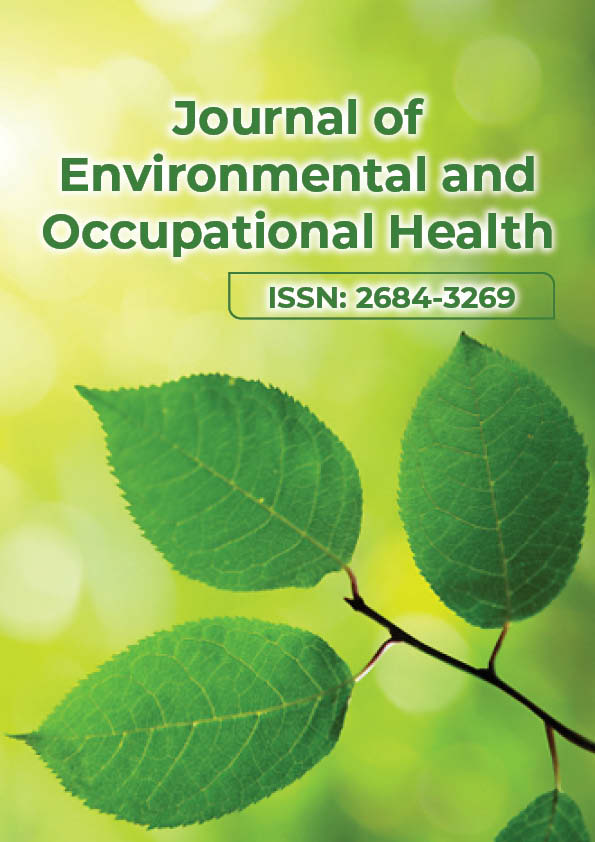Perspective - Journal of Environmental and Occupational Health (2023)
Understanding the Health Impacts of Air Pollution
Lei Yang*Lei Yang, Department of Healthcare Management, Sanda University, Shanghai, China, Email: yang125@gmail.com
Received: 22-Apr-2023, Manuscript No. JENVOH-23-102168; Editor assigned: 25-Apr-2023, Pre QC No. JENVOH-23-102168 (PQ); Reviewed: 09-May-2023, QC No. JENVOH-23-102168; Revised: 16-May-2023, Manuscript No. JENVOH-23-102168 (R); Published: 23-May-2023
Description
Air pollution has emerged as a global crisis, affecting the health of millions of people and the delicate balance of the environment. The release of harmful substances into the air, both from natural and human activities, has led to a significant degradation in air quality. This essay explores the causes, impacts, and potential solutions to address the issue of air pollution.
Causes of air pollution
Air pollution can be attributed to a wide range of factors. Anthropogenic activities such as industrial emissions, vehicle exhaust fumes, burning of fossil fuels, and the use of chemical fertilizers contribute significantly to air pollution. Natural causes like volcanic eruptions, dust storms, and wildfires also release harmful particles into the atmosphere. Additionally, indoor sources like cooking fuels and tobacco smoke contribute to indoor air pollution.
Impacts of air pollution
The consequences of air pollution are profound and far-reaching. The primary impact is on human health, with air pollution being linked to respiratory diseases such as asthma, bronchitis, and lung cancer. Prolonged exposure to polluted air can also lead to cardiovascular issues and premature death. Moreover, air pollution affects the environment by contributing to climate change, damaging ecosystems, and reducing agricultural productivity. Acid rain, caused by the release of sulfur dioxide and nitrogen oxides, leads to the degradation of forests, water bodies, and historical monuments.
Effects on human health
Air pollution poses significant risks to human health. Particulate matter (PM), ozone (O3), sulfur dioxide (SO2), nitrogen dioxide (NO2), and carbon monoxide (CO) are the major air pollutants that can directly impact respiratory and cardiovascular systems. Fine particles, PM2.5, can penetrate deep into the lungs, causing inflammation and respiratory problems. Long-term exposure to air pollution has been associated with reduced lung function, increased allergies, and a higher risk of developing chronic diseases. Vulnerable populations such as children, the elderly, and individuals with pre-existing health conditions are particularly at risk.
Environmental impacts
Air pollution also has severe implications for the environment. Greenhouse gases released from human activities contribute to global warming and climate change, resulting in rising temperatures, altered weather patterns, and melting ice caps. Pollutants emitted into the atmosphere can harm biodiversity and disrupt ecosystems. Acid rain damages soil fertility, depletes fish populations in water bodies, and causes the decline of sensitive plant species. Additionally, air pollution can lead to a decrease in crop yields, affecting food security and exacerbating global hunger.
Addressing air pollution
To combat air pollution, a comprehensive and multipronged approach is required. Governments and regulatory bodies must implement stricter emission standards and promote the use of clean technologies. Encouraging the transition to renewable energy sources, such as solar and wind power, can help reduce reliance on fossil fuels. Promoting sustainable transportation alternatives like electric vehicles and improving public transport systems can significantly reduce vehicle emissions. Additionally, public awareness campaigns can educate individuals on the importance of reducing personal contributions to air pollution, such as avoiding burning waste and using eco-friendly products.
Air pollution poses a significant threat to human health and the environment, necessitating immediate action. The collaboration of governments, industries, and individuals is crucial in adopting sustainable practices and mitigating the sources of pollution. By implementing stringent regulations, promoting clean technologies, and raising awareness can pave the way for a cleaner and healthier future. It is a responsibility to take decisive steps to combat air pollution and protect the well-being of current and future generations.
Copyright: © 2023 The Authors. This is an open access article under the terms of the Creative Commons Attribution Non Commercial Share Alike 4.0 (https://creativecommons.org/licenses/by-nc-sa/4.0/). This is an open access article distributed under the terms of the Creative Commons Attribution License, which permits unrestricted use, distribution, and reproduction in any medium, provided the original work is properly cited.





